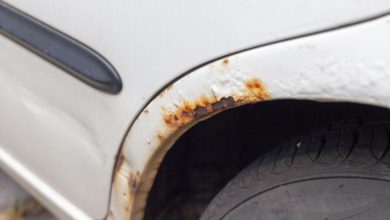7 car noises and what they mean
Hmm. Purr. Vroom. Modern engineering has made cars a joy to listen to. But what do you do when you suddenly hear one you’re not familiar with? Should you worry? Here are some car noises you don’t want to hear, because they can signal trouble.
Read more: Signs your car needs a checkup
Rattling sounds like a coin in a washing machine
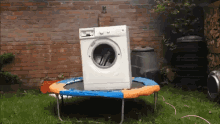
If you’ve forgotten to take the coins out of your clothes pockets before dumping them into the wash, then you’ll know how this sounds. Here are some reasons why your car is making these sounds:
Loose lug nut
Does the rattling sound stop as you drive faster? It could be a loose lug nut inside a hub cap – meaning your wheel wasn’t tightened properly the last time it was removed and replaced. Take your car to a mechanic ASAP, or tighten it yourself if you know how.
Catalytic converter complications
The catalytic converter removes toxic fumes from a car’s exhaust fumes, so clearly it’s wise to keep it functioning right. A rattling sound honestly spells trouble.
If the rattling sounds happen when it starts up then stops after, it might just be a loose heat shield. If it occurs frequently, then it could be a failing ceramic honeycomb, which might have been shaken loose or even broken to pieces.
Squealing or grinding sounds
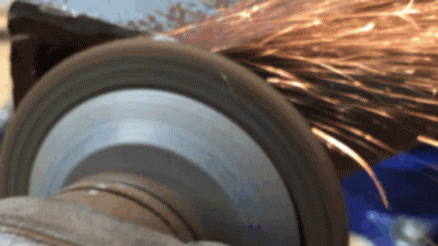
Brake pad not working correctly
Brake pads nowadays are actually designed to make a noise when they’re worn so you know when to replace them. If you don’t act quickly, your car’s brake discs may be damaged, and this will cost a lot more to repair than replacement pads.
Squeaking sounds may also come from debris, such as a small stone that is stuck between the pad and disc. This may dislodge by itself after a short journey, but if the noise persists you may need to visit a mechanic to remove the stone.
Unlubricated brake pads
If you hear grinding, it is most likely the calliper bolts holding the brake calliper firmly in place have rusted instead of some moving part. Frequent lubrication as per your mechanics instructions can prevent this from happening.
A popping, finger-snapping, or clicking sound
Although playing with firecrackers is fun, you don’t want your car to sound like you’re celebrating Chinese New Year early.
Constant velocity joint woes
It’s bad news if you hear lots of popping sounds when you accelerate or turn a corner, especially if you’re steering an all-wheel-drive or front-wheel-drive. It is likely that one or both of the constant velocity (CV) joints on your front axle needs replacing. The CV axles transfer rotational force from the transaxle to the front wheels, so you should really get these looked at before more problems crop up with your axle or wheels.
Battered battery
If you hear a clicking sound when you start up your car, but nothing happens, then it likely means your car battery is busted. This sound is actually the starter motor turning on and off rapidly as it does not have enough power to start the engine. It is possible that your electrical system is in need of repair, but usually it is just a flat battery. Pop the hood and give it a quick look to confirm it is your battery that’s the issue before calling a mechanic.
Read more: How to change a car battery
Read more: How to jump start a car
Rhythmic squeaks that sound like a bad supermarket trolley
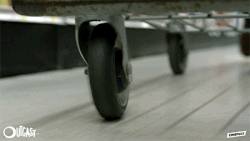
Ageing Alternator
When you hear squeaking noises coming from the car engine, it is a telltale sign your alternator may be close to expiring. Pay attention to a burning smell and of course check your dashboard for any warning lights ,but don’t wait for these two before going to the mechanic! That’s because your alternator is responsible for charging your car battery when you drive and regulates the electricity that powers all the components of your car. A faulty one spells trouble!
Read more: Important car dashboard symbols
Running low on power steering fluid
If you’re hearing squeaks as you make your turns (and not while on a straight road), then the likely cause is a leaky power steering fluid. The squeaks you’re hearing are actually the horrible sounds of metal rubbing against metal.
Simply take a look at the reservoir to check if it has enough fluid and check for leaks just in case. Top it up if there is insufficient power steering fluid and replace any leaky components and you should be golden!
Read more: Car fluids
A howling, growling or even “singing”

Melodious tunes, these are not.
Bad ball bearings
A very likely cause of these noises could be faulty ball bearings – tiny metal balls that help parts rotate smoothly. If it’s coming from the front and your car is a front-wheel drive, it is likely your front wheel bearings. A gradually growing, steady howl signals a problem in the rear-wheel bearings. It’s best to get these changed asap – faulty bearings have been known to cause wheels to stop while driving.
However, if you have a rear-wheel drive, and the howling matches your acceleration, your differential which controls how your wheels spin could be leaking fluid.
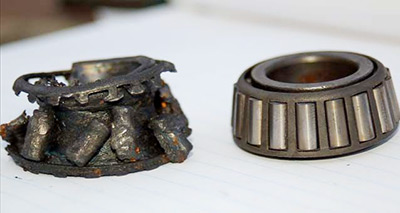
Honestly though, if you hear your car screaming as if it is in pain, do you really need another reason to see the mechanic?
Rhythmic clunking, tapping, or banging from under the hood
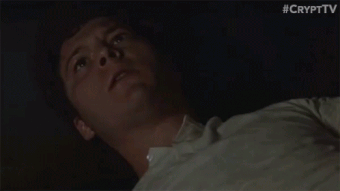
This one almost sounds like there’s someone underneath your hood begging to be let out. Not good!
Faulty EGR valves
Exhaust gas recirculation (EGR) valves have but one job: to recirculate carefully controlled amounts of exhaust gas back into the engine. This improves engine efficiency, thereby reducing fuel consumption and lowering harmful emissions of nitrogen oxides.
Over time, these valves will wear and will not function as well as before. This could result in the engine valve sticking open or shut. This will result in the knocking sound you hear, also known as engine knock. Your check engine light may also turn on. In either case, get your car checked!
Bad connecting rods
Another source of engine knock is low clearance between the connecting rod bearing surface and the crankshaft. This problem is caused by a lack of lubrication which can damage the crankshaft surface. You should frequently change your engine oil as particles in dirty oil can wear the surface of the bearings.
As this problem is directly tied to the functioning of your car’s engine, you should go to a mechanic immediately to avoid more serious damage down the line (have you noticed the pattern yet?). Unfortunately, such a critical component being damaged or worn would require expensive repairs, so change your engine oil frequently!
Squealing under the hood
A worn cambelt
A sure sign of a worn cambelt is when your car squeaks when you step on the gas. This belt rotates the engine’s crankshaft and cam, so these two systems are synchronised and the pistons firing at regular intervals. Over time, friction will degrade the cambelt and it should be replaced before it breaks. Should it break, the damage to your engine can be severe to the point it may need replacing!
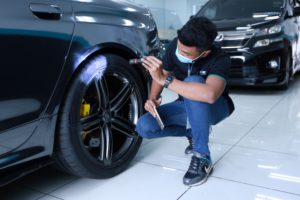
Cars are marvels of engineering. The sounds they make can be beautiful and terrifying in equal measure. Make sure you become familiar with your car and keep an ear out for the noises above! When it comes to machines like cars, paying close attention to the way they sound can be the difference between a cheap and easy fix and a bank breaking one.
So if you hear any of the above unnatural noises coming from your car, just drop by a myTukar workshop! We will get your car purring the way it used to in no time. Or you can visit our website and get a quotation with us today!






